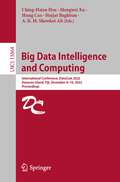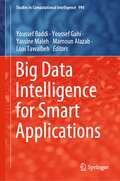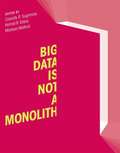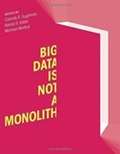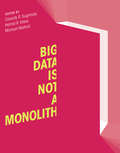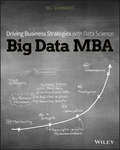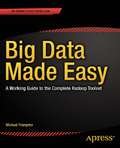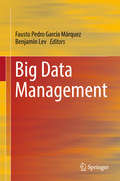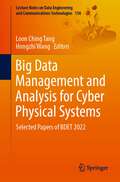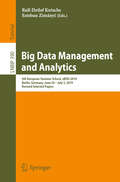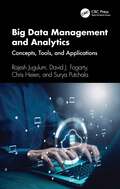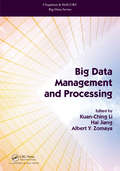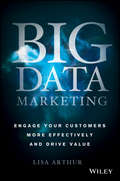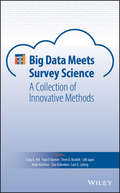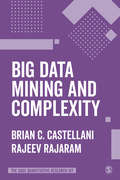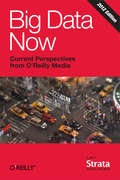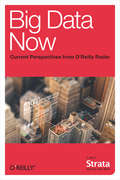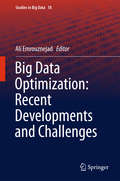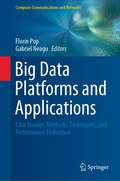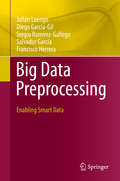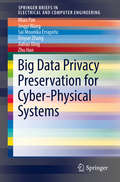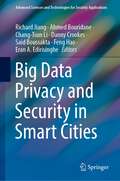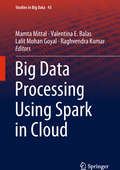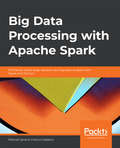- Table View
- List View
Big Data Intelligence and Computing: International Conference, DataCom 2022, Denarau Island, Fiji, December 8–10, 2022, Proceedings (Lecture Notes in Computer Science #13864)
by Ching-Hsien Hsu A. B. M. Shawkat Ali Hung Cao Mengwei Xu Hojjat BaghbanThis book constitutes the proceedings of the International Conference on Big Data Intelligence and Computing, DataCom 2022, which took place in Denarau Island, Fiji, in December 2022. The 30 full papers included in this volume were carefully reviewed and selected from 88 submissions. The papers detail big data analytics solutions, distributed computation paradigms, on-demand services, autonomic systems, and pervasive applications.
Big Data Intelligence for Smart Applications (Studies in Computational Intelligence #994)
by Yassine Maleh Mamoun Alazab Youssef Baddi Loai Tawalbeh Youssef GahiToday, the use of machine intelligence, expert systems, and analytical technologies combined with Big Data is the natural evolution of both disciplines. As a result, there is a pressing need for new and innovative algorithms to help us find effective and practical solutions for smart applications such as smart cities, IoT, healthcare, and cybersecurity.This book presents the latest advances in big data intelligence for smart applications. It explores several problems and their solutions regarding computational intelligence and big data for smart applications. It also discusses new models, practical solutions,and technological advances related to developing and transforming cities through machine intelligence and big data models and techniques. This book is helpful for students and researchers as well as practitioners.
Big Data Is Not a Monolith
by Cassidy R. Sugimoto Hamid R. Ekbia Michael MattioliBig data is ubiquitous but heterogeneous. Big data can be used to tally clicks and traffic on web pages, find patterns in stock trades, track consumer preferences, identify linguistic correlations in large corpuses of texts. This book examines big data not as an undifferentiated whole but contextually, investigating the varied challenges posed by big data for health, science, law, commerce, and politics. Taken together, the chapters reveal a complex set of problems, practices, and policies.The advent of big data methodologies has challenged the theory-driven approach to scientific knowledge in favor of a data-driven one. Social media platforms and self-tracking tools change the way we see ourselves and others. The collection of data by corporations and government threatens privacy while promoting transparency. Meanwhile, politicians, policy makers, and ethicists are ill-prepared to deal with big data's ramifications. The contributors look at big data's effect on individuals as it exerts social control through monitoring, mining, and manipulation; big data and society, examining both its empowering and its constraining effects; big data and science, considering issues of data governance, provenance, reuse, and trust; and big data and organizations, discussing data responsibility, "data harm," and decision making.ContributorsRyan Abbott, Cristina Alaimo, Kent R. Anderson, Mark Andrejevic, Diane E. Bailey, Mike Bailey, Mark Burdon, Fred H. Cate, Jorge L. Contreras, Simon DeDeo, Hamid R. Ekbia, Allison Goodwell, Jannis Kallinikos, Inna Kouper, M. Lynne Markus, Michael Mattioli, Paul Ohm, Scott Peppet, Beth Plale, Jason Portenoy, Julie Rennecker, Katie Shilton, Dan Sholler, Cassidy R. Sugimoto, Isuru Suriarachchi, Jevin D. West
Big Data Is Not a Monolith
by Cassidy R. Sugimoto Hamid R. Ekbia Michael MattioliBig data is ubiquitous but heterogeneous. Big data can be used to tally clicks and traffic on web pages, find patterns in stock trades, track consumer preferences, identify linguistic correlations in large corpuses of texts. This book examines big data not as an undifferentiated whole but contextually, investigating the varied challenges posed by big data for health, science, law, commerce, and politics. Taken together, the chapters reveal a complex set of problems, practices, and policies.The advent of big data methodologies has challenged the theory-driven approach to scientific knowledge in favor of a data-driven one. Social media platforms and self-tracking tools change the way we see ourselves and others. The collection of data by corporations and government threatens privacy while promoting transparency. Meanwhile, politicians, policy makers, and ethicists are ill-prepared to deal with big data's ramifications. The contributors look at big data's effect on individuals as it exerts social control through monitoring, mining, and manipulation; big data and society, examining both its empowering and its constraining effects; big data and science, considering issues of data governance, provenance, reuse, and trust; and big data and organizations, discussing data responsibility, "data harm," and decision making.ContributorsRyan Abbott, Cristina Alaimo, Kent R. Anderson, Mark Andrejevic, Diane E. Bailey, Mike Bailey, Mark Burdon, Fred H. Cate, Jorge L. Contreras, Simon DeDeo, Hamid R. Ekbia, Allison Goodwell, Jannis Kallinikos, Inna Kouper, M. Lynne Markus, Michael Mattioli, Paul Ohm, Scott Peppet, Beth Plale, Jason Portenoy, Julie Rennecker, Katie Shilton, Dan Sholler, Cassidy R. Sugimoto, Isuru Suriarachchi, Jevin D. West
Big Data Is Not a Monolith (Information Policy)
by Cassidy R. Sugimoto Hamid R. Ekbia Michael MattioliPerspectives on the varied challenges posed by big data for health, science, law, commerce, and politics.Big data is ubiquitous but heterogeneous. Big data can be used to tally clicks and traffic on web pages, find patterns in stock trades, track consumer preferences, identify linguistic correlations in large corpuses of texts. This book examines big data not as an undifferentiated whole but contextually, investigating the varied challenges posed by big data for health, science, law, commerce, and politics. Taken together, the chapters reveal a complex set of problems, practices, and policies.The advent of big data methodologies has challenged the theory-driven approach to scientific knowledge in favor of a data-driven one. Social media platforms and self-tracking tools change the way we see ourselves and others. The collection of data by corporations and government threatens privacy while promoting transparency. Meanwhile, politicians, policy makers, and ethicists are ill-prepared to deal with big data's ramifications. The contributors look at big data's effect on individuals as it exerts social control through monitoring, mining, and manipulation; big data and society, examining both its empowering and its constraining effects; big data and science, considering issues of data governance, provenance, reuse, and trust; and big data and organizations, discussing data responsibility, “data harm,” and decision making.ContributorsRyan Abbott, Cristina Alaimo, Kent R. Anderson, Mark Andrejevic, Diane E. Bailey, Mike Bailey, Mark Burdon, Fred H. Cate, Jorge L. Contreras, Simon DeDeo, Hamid R. Ekbia, Allison Goodwell, Jannis Kallinikos, Inna Kouper, M. Lynne Markus, Michael Mattioli, Paul Ohm, Scott Peppet, Beth Plale, Jason Portenoy, Julie Rennecker, Katie Shilton, Dan Sholler, Cassidy R. Sugimoto, Isuru Suriarachchi, Jevin D. West
Big Data MBA
by Bill SchmarzoIntegrate big data into business to drive competitive advantage and sustainable success Big Data MBA brings insight and expertise to leveraging big data in business so you can harness the power of analytics and gain a true business advantage. Based on a practical framework with supporting methodology and hands-on exercises, this book helps identify where and how big data can help you transform your business. You'll learn how to exploit new sources of customer, product, and operational data, coupled with advanced analytics and data science, to optimize key processes, uncover monetization opportunities, and create new sources of competitive differentiation. The discussion includes guidelines for operationalizing analytics, optimal organizational structure, and using analytic insights throughout your organization's user experience to customers and front-end employees alike. You'll learn to "think like a data scientist" as you build upon the decisions your business is trying to make, the hypotheses you need to test, and the predictions you need to produce. Business stakeholders no longer need to relinquish control of data and analytics to IT. In fact, they must champion the organization's data collection and analysis efforts. This book is a primer on the business approach to analytics, providing the practical understanding you need to convert data into opportunity. Understand where and how to leverage big data Integrate analytics into everyday operations Structure your organization to drive analytic insights Optimize processes, uncover opportunities, and stand out from the rest Help business stakeholders to "think like a data scientist" Understand appropriate business application of different analytic techniques If you want data to transform your business, you need to know how to put it to use. Big Data MBA shows you how to implement big data and analytics to make better decisions.
Big Data Made Easy: A Working Guide to the Complete Hadoop Toolset
by Michael FramptonMany corporations are finding that the size of their data sets are outgrowing the capability of their systems to store and process them. The data is becoming too big to manage and use with traditional tools. The solution: implementing a big data system. As Big Data Made Easy: A Working Guide to the Complete Hadoop Toolset shows, Apache Hadoop offers a scalable, fault-tolerant system for storing and processing data in parallel. It has a very rich toolset that allows for storage (Hadoop), configuration (YARN and ZooKeeper), collection (Nutch and Solr), processing (Storm, Pig, and Map Reduce), scheduling (Oozie), moving (Sqoop and Avro), monitoring (Chukwa, Ambari, and Hue), testing (Big Top), and analysis (Hive). The problem is that the Internet offers IT pros wading into big data many versions of the truth and some outright falsehoods born of ignorance. What is needed is a book just like this one: a wide-ranging but easily understood set of instructions to explain where to get Hadoop tools, what they can do, how to install them, how to configure them, how to integrate them, and how to use them successfully. And you need an expert who has worked in this area for a decade--someone just like author and big data expert Mike Frampton. Big Data Made Easy approaches the problem of managing massive data sets from a systems perspective, and it explains the roles for each project (like architect and tester, for example) and shows how the Hadoop toolset can be used at each system stage. It explains, in an easily understood manner and through numerous examples, how to use each tool. The book also explains the sliding scale of tools available depending upon data size and when and how to use them. Big Data Made Easy shows developers and architects, as well as testers and project managers, how to: Store big dataConfigure big dataProcess big dataSchedule processesMove data among SQL and NoSQL systemsMonitor dataPerform big data analytics Report on big data processes and projectsTest big data systemsBig Data Made Easy also explains the best part, which is that this toolset is free. Anyone can download it and--with the help of this book--start to use it within a day. With the skills this book will teach you under your belt, you will add value to your company or client immediately, not to mention your career.
Big Data Management
by Fausto Pedro García Márquez Benjamin LevThis book focuses on the analytic principles of business practice and big data. Specifically, it provides an interface between the main disciplines of engineering/technology and the organizational and administrative aspects of management, serving as a complement to books in other disciplines such as economics, finance, marketing and risk analysis. The contributors present their areas of expertise, together with essential case studies that illustrate the successful application of engineering management theories in real-life examples.
Big Data Management and Analysis for Cyber Physical Systems: Selected Papers of BDET 2022 (Lecture Notes on Data Engineering and Communications Technologies #150)
by Hongzhi Wang Loon Ching TangThis book consists of selected and peer-reviewed papers presented at 2022 4th International Conference on Big Data Engineering and Technology (BDET), held during April 22–24, 2022, in Singapore. As IT infrastructure and data management technologies have become critical assets and capabilities for today’s enterprises, this book aims to be part of the effort in contributing to their development. In particular, the BDET conference series aims to provide the much needed forum for researchers and practitioners across the world who are actively engaged in advancing research and raising awareness of the many challenges in the diverse field of big data engineering and technology to share their research outcomes and bounce ideas off their international colleagues. Over the last few years, the conference series has brought together the latest developments of novel theory in big data, algorithm and applications, emerging standards for big data, big data infrastructure, MapReduce and cloud computing, big data visualization, big data curation and management, big data semantics, scientific discovery and intelligence, which collectively form parts of the cyber-physical systems of interest. It is hoped that the book will prove useful to students, researchers, and professionals working in the field of big data engineering and applications in cyber-physical systems.
Big Data Management and Analytics: 9th European Summer School, eBISS 2019, Berlin, Germany, June 30 – July 5, 2019, Revised Selected Papers (Lecture Notes in Business Information Processing #390)
by Esteban Zimányi Ralf-Detlef KutscheThis book constitutes 5 revised tutorial lectures of the 9th European Business Intelligence and Big Data Summer School, eBISS 2019, held in Berlin, Germany, during June 30 – July 5, 2019. The tutorials were given by renowned experts and covered advanced aspects of business intelligence and big data. This summer school, presented by leading researchers in the field, represented an opportunity for postgraduate students to equip themselves with the theoretical and practical skills necessary for developing challenging business intelligence applications.
Big Data Management and Analytics: Concepts, Tools, and Applications
by Rajesh Jugulum David J. Fogarty Chris Heien Surya PutchalaAs more companies go digital and conduct their business online, this book provides practical examples of how they can better manage their data and use it to generate maximum value. It offers an integrated approach by treating data as an asset and discusses how to preserve and protect it just like any other corporate asset.Big Data Management and Analytics: Concepts, Tools, and Applications illustrates effective strategies for managing, governing, and analyzing big data to gain a competitive edge for companies utilizing big data and analytics. It offers a comprehensive guide on methods, tools, and concepts to efficiently manage and analyze big data in order to make informed decisions. Additionally, this book explores the significance of artificial intelligence and machine learning in leveraging big data and how they can be optimized in a well-structured environment. This book also emphasizes treating big data as a valuable asset and outlines strategies for preserving and safeguarding it like any other corporate asset. The inclusion of case studies ensures that the methodologies and concepts presented can be easily implemented in day-to-day operations.Given the current significance of big data in the business world, this book equips readers with the necessary skills to effectively manage this valuable asset. It is tailored for practitioners, students, and professionals working in data mining, big data, and machine learning across various industries, including manufacturing.
Big Data Management and Processing (Chapman & Hall/CRC Big Data Series)
by Kuan-Ching Li, Hai Jiang and Albert Y. ZomayaFrom the Foreword: "Big Data Management and Processing is [a] state-of-the-art book that deals with a wide range of topical themes in the field of Big Data. The book, which probes many issues related to this exciting and rapidly growing field, covers processing, management, analytics, and applications... [It] is a very valuable addition to the literature. It will serve as a source of up-to-date research in this continuously developing area. The book also provides an opportunity for researchers to explore the use of advanced computing technologies and their impact on enhancing our capabilities to conduct more sophisticated studies." ---Sartaj Sahni, University of Florida, USA "Big Data Management and Processing covers the latest Big Data research results in processing, analytics, management and applications. Both fundamental insights and representative applications are provided. This book is a timely and valuable resource for students, researchers and seasoned practitioners in Big Data fields. --Hai Jin, Huazhong University of Science and Technology, China Big Data Management and Processing explores a range of big data related issues and their impact on the design of new computing systems. The twenty-one chapters were carefully selected and feature contributions from several outstanding researchers. The book endeavors to strike a balance between theoretical and practical coverage of innovative problem solving techniques for a range of platforms. It serves as a repository of paradigms, technologies, and applications that target different facets of big data computing systems. The first part of the book explores energy and resource management issues, as well as legal compliance and quality management for Big Data. It covers In-Memory computing and In-Memory data grids, as well as co-scheduling for high performance computing applications. The second part of the book includes comprehensive coverage of Hadoop and Spark, along with security, privacy, and trust challenges and solutions. The latter part of the book covers mining and clustering in Big Data, and includes applications in genomics, hospital big data processing, and vehicular cloud computing. The book also analyzes funding for Big Data projects.
Big Data Marketing
by Lisa ArthurLeverage big data insights to improve customer experiences and insure business successMany of today's businesses find themselves caught in a snarl of internal data, paralyzed by internal silos, and executing antiquated marketing approaches. As a result, consumers are losing patience, shareholders are clamoring for growth and differentiation, and marketers are left struggling to untangle the massive mess. Big Data Marketing provides a strategic road map for executives who want to clear the chaos and start driving competitive advantage and top line growth. Using real-world examples, non-technical language, additional downloadable resources, and a healthy dose of humor, Big Data Marketing will help you discover the remedy offered by data-driven marketing.Explains how marketers can use data to learn what they need to knowDetails strategies to drive marketing relevance and Return On Marketing Investment (ROMI)Provides a five-step approach in the journey to a more data-driven marketing organizationAuthor Lisa Arthur, the Chief Marketing Officer for Teradata Applications, the leader in integrated marketing software, meets with thousands of CMOs and marketing professionals annually through public speaking and eventsBig Data Marketing reveals patterns in your customers' behavior and proven ways to elevate customer experiences. Leverage these insights to insure your business's success.
Big Data Meets Survey Science: A Collection of Innovative Methods (Wiley Series in Survey Methodology)
by Craig A HillOffers a clear view of the utility and place for survey data within the broader Big Data ecosystem This book presents a collection of snapshots from two sides of the Big Data perspective. It assembles an array of tangible tools, methods, and approaches that illustrate how Big Data sources and methods are being used in the survey and social sciences to improve official statistics and estimates for human populations. It also provides examples of how survey data are being used to evaluate and improve the quality of insights derived from Big Data. Big Data Meets Survey Science: A Collection of Innovative Methods shows how survey data and Big Data are used together for the benefit of one or more sources of data, with numerous chapters providing consistent illustrations and examples of survey data enriching the evaluation of Big Data sources. Examples of how machine learning, data mining, and other data science techniques are inserted into virtually every stage of the survey lifecycle are presented. Topics covered include: Total Error Frameworks for Found Data; Performance and Sensitivities of Home Detection on Mobile Phone Data; Assessing Community Wellbeing Using Google Street View and Satellite Imagery; Using Surveys to Build and Assess RBS Religious Flag; and more. Presents groundbreaking survey methods being utilized today in the field of Big Data Explores how machine learning methods can be applied to the design, collection, and analysis of social science data Filled with examples and illustrations that show how survey data benefits Big Data evaluation Covers methods and applications used in combining Big Data with survey statistics Examines regulations as well as ethical and privacy issues Big Data Meets Survey Science: A Collection of Innovative Methods is an excellent book for both the survey and social science communities as they learn to capitalize on this new revolution. It will also appeal to the broader data and computer science communities looking for new areas of application for emerging methods and data sources.
Big Data Mining and Complexity (The SAGE Quantitative Research Kit)
by Rajeev Rajaram Brian C. CastellaniThis book offers a much needed critical introduction to data mining and ‘big data’. Supported by multiple case studies and examples, the authors provide: Digestible overviews of key terms and concepts relevant to using social media data in quantitative research. A critical review of data mining and ‘big data’ from a complexity science perspective, including its future potential and limitations A practical exploration of the challenges of putting together and managing a ‘big data’ database An evaluation of the core mathematical and conceptual frameworks, grounded in a case-based computational modeling perspective, which form the foundations of all data mining techniques Part of The SAGE Quantitative Research Kit, this book will give you the know-how and confidence needed to succeed on your quantitative research journey.
Big Data Mining and Complexity (The SAGE Quantitative Research Kit)
by Rajeev Rajaram Brian C. CastellaniThis book offers a much needed critical introduction to data mining and ‘big data’. Supported by multiple case studies and examples, the authors provide: Digestible overviews of key terms and concepts relevant to using social media data in quantitative research. A critical review of data mining and ‘big data’ from a complexity science perspective, including its future potential and limitations A practical exploration of the challenges of putting together and managing a ‘big data’ database An evaluation of the core mathematical and conceptual frameworks, grounded in a case-based computational modeling perspective, which form the foundations of all data mining techniques Part of The SAGE Quantitative Research Kit, this book will give you the know-how and confidence needed to succeed on your quantitative research journey.
Big Data Now: 2012 Edition
by Inc. O'Reilly MediaThe Big Data Now anthology is relevant to anyone who creates, collectsor relies upon data. It's not just a technical book or just a businessguide. Data is ubiquitous and it doesn't pay much attention toborders, so we've calibrated our coverage to follow it wherever itgoes.In the first edition of Big Data Now, the O'Reilly team tracked thebirth and early development of data tools and data science. Now, withthis second edition, we're seeing what happens when big data grows up:how it's being applied, where it's playing a role, and theconsequences -- good and bad alike -- of data's ascendance.We've organized the second edition of Big Data Now into five areas:Getting Up to Speed With Big Data -- Essential information on thestructures and definitions of big data.Big Data Tools, Techniques, and Strategies -- Expert guidance forturning big data theories into big data products.The Application of Big Data -- Examples of big data in action,including a look at the downside of data.What to Watch for in Big Data -- Thoughts on how big data will evolveand the role it will play across industries and domains.Big Data and Health Care -- A special section exploring thepossibilities that arise when data and health care come together.
Big Data Now: Current Perspectives from O'Reilly Radar
by O'Reilly Radar TeamThis collection represents the full spectrum of data-related content we’ve published on O’Reilly Radar over the last year. Mike Loukides kicked things off in June 2010 with “What is data science?” and from there we’ve pursued the various threads and themes that naturally emerged. Now, roughly a year later, we can look back over all we’ve covered and identify a number of core data areas: Data issues -- The opportunities and ambiguities of the data space are evident in discussions around privacy, the implications of data-centric industries, and the debate about the phrase “data science” itself. The application of data: products and processes – A “data product” can emerge from virtually any domain, including everything from data startups to established enterprises to media/journalism to education and research. Data science and data tools -- The tools and technologies that drive data science are of course essential to this space, but the varied techniques being applied are also key to understanding the big data arena.The business of data – Take a closer look at the actions connected to data -- the finding, organizing, and analyzing that provide organizations of all sizes with the information they need to compete.
Big Data Optimization: Recent Developments and Challenges (Studies in Big Data #18)
by Ali EmrouznejadThemain objective of this book is to provide the necessary background to work withbig data by introducing some novel optimization algorithms and codes capable ofworking in the big data setting as well as introducing some applications in bigdata optimization for both academics and practitioners interested, and tobenefit society, industry, academia, and government. Presenting applications ina variety of industries, this book will be useful for the researchers aiming toanalyses large scale data. Several optimization algorithms for big dataincluding convergent parallel algorithms, limited memory bundle algorithm,diagonal bundle method, convergent parallel algorithms, network analytics, andmany more have been explored in this book.
Big Data Platforms and Applications: Case Studies, Methods, Techniques, and Performance Evaluation (Computer Communications and Networks)
by Florin Pop Gabriel NeaguThis book provides a review of advanced topics relating to the theory, research, analysis and implementation in the context of big data platforms and their applications, with a focus on methods, techniques, and performance evaluation. The explosive growth in the volume, speed, and variety of data being produced every day requires a continuous increase in the processing speeds of servers and of entire network infrastructures, as well as new resource management models. This poses significant challenges (and provides striking development opportunities) for data intensive and high-performance computing, i.e., how to efficiently turn extremely large datasets into valuable information and meaningful knowledge.The task of context data management is further complicated by the variety of sources such data derives from, resulting in different data formats, with varying storage, transformation, delivery, and archiving requirements. At the same time rapid responses are needed for real-time applications. With the emergence of cloud infrastructures, achieving highly scalable data management in such contexts is a critical problem, as the overall application performance is highly dependent on the properties of the data management service.
Big Data Preprocessing: Enabling Smart Data
by Francisco Herrera Salvador García Julián Luengo Diego García-Gil Sergio Ramírez-GallegoThis book offers a comprehensible overview of Big Data Preprocessing, which includes a formal description of each problem. It also focuses on the most relevant proposed solutions. This book illustrates actual implementations of algorithms that helps the reader deal with these problems. This book stresses the gap that exists between big, raw data and the requirements of quality data that businesses are demanding. This is called Smart Data, and to achieve Smart Data the preprocessing is a key step, where the imperfections, integration tasks and other processes are carried out to eliminate superfluous information. The authors present the concept of Smart Data through data preprocessing in Big Data scenarios and connect it with the emerging paradigms of IoT and edge computing, where the end points generate Smart Data without completely relying on the cloud.Finally, this book provides some novel areas of study that are gathering a deeper attention on the Big Data preprocessing. Specifically, it considers the relation with Deep Learning (as of a technique that also relies in large volumes of data), the difficulty of finding the appropriate selection and concatenation of preprocessing techniques applied and some other open problems.Practitioners and data scientists who work in this field, and want to introduce themselves to preprocessing in large data volume scenarios will want to purchase this book. Researchers that work in this field, who want to know which algorithms are currently implemented to help their investigations, may also be interested in this book.
Big Data Privacy Preservation for Cyber-Physical Systems (SpringerBriefs in Electrical and Computer Engineering)
by Zhu Han Jingyi Wang Miao Pan Sai Mounika Errapotu Xinyue Zhang Jiahao DingThis SpringerBrief mainly focuses on effective big data analytics for CPS, and addresses the privacy issues that arise on various CPS applications. The authors develop a series of privacy preserving data analytic and processing methodologies through data driven optimization based on applied cryptographic techniques and differential privacy in this brief. This brief also focuses on effectively integrating the data analysis and data privacy preservation techniques to provide the most desirable solutions for the state-of-the-art CPS with various application-specific requirements. <P><P> Cyber-physical systems (CPS) are the “next generation of engineered systems,” that integrate computation and networking capabilities to monitor and control entities in the physical world. Multiple domains of CPS typically collect huge amounts of data and rely on it for decision making, where the data may include individual or sensitive information, for e.g., smart metering, intelligent transportation, healthcare, sensor/data aggregation, crowd sensing etc. This brief assists users working in these areas and contributes to the literature by addressing data privacy concerns during collection, computation or big data analysis in these large scale systems. Data breaches result in undesirable loss of privacy for the participants and for the entire system, therefore identifying the vulnerabilities and developing tools to mitigate such concerns is crucial to build high confidence CPS. <P><P> This Springerbrief targets professors, professionals and research scientists working in Wireless Communications, Networking, Cyber-Physical Systems and Data Science. Undergraduate and graduate-level students interested in Privacy Preservation of state-of-the-art Wireless Networks and Cyber-Physical Systems will use this Springerbrief as a study guide.
Big Data Privacy and Security in Smart Cities (Advanced Sciences and Technologies for Security Applications)
by Ahmed Bouridane Richard Jiang Danny Crookes Chang-Tsun Li Feng Hao Said Boussakta Eran A. EdirisingheThis book highlights recent advances in smart cities technologies, with a focus on new technologies such as biometrics, blockchains, data encryption, data mining, machine learning, deep learning, cloud security, and mobile security. During the past five years, digital cities have been emerging as a technology reality that will come to dominate the usual life of people, in either developed or developing countries. Particularly, with big data issues from smart cities, privacy and security have been a widely concerned matter due to its relevance and sensitivity extensively present in cybersecurity, healthcare, medical service, e-commercial, e-governance, mobile banking, e-finance, digital twins, and so on. These new topics rises up with the era of smart cities and mostly associate with public sectors, which are vital to the modern life of people. This volume summarizes the recent advances in addressing the challenges on big data privacy and security in smart cities and points out the future research direction around this new challenging topic.
Big Data Processing Using Spark in Cloud (Studies in Big Data #43)
by Raghvendra Kumar Mamta Mittal Valentina E. Balas Lalit Mohan GoyalThe book describes the emergence of big data technologies and the role of Spark in the entire big data stack. It compares Spark and Hadoop and identifies the shortcomings of Hadoop that have been overcome by Spark. The book mainly focuses on the in-depth architecture of Spark and our understanding of Spark RDDs and how RDD complements big data’s immutable nature, and solves it with lazy evaluation, cacheable and type inference. It also addresses advanced topics in Spark, starting with the basics of Scala and the core Spark framework, and exploring Spark data frames, machine learning using Mllib, graph analytics using Graph X and real-time processing with Apache Kafka, AWS Kenisis, and Azure Event Hub. It then goes on to investigate Spark using PySpark and R. Focusing on the current big data stack, the book examines the interaction with current big data tools, with Spark being the core processing layer for all types of data. The book is intended for data engineers and scientists working on massive datasets and big data technologies in the cloud. In addition to industry professionals, it is helpful for aspiring data processing professionals and students working in big data processing and cloud computing environments.
Big Data Processing with Apache Spark: Efficiently tackle large datasets and big data analysis with Spark and Python
by Manuel Ignacio Franco GaleanoNo need to spend hours ploughing through endless data – let Spark, one of the fastest big data processing engines available, do the hard work for you.Key FeaturesGet up and running with Apache Spark and PythonIntegrate Spark with AWS for real-time analyticsApply processed data streams to machine learning APIs of Apache SparkBook DescriptionProcessing big data in real time is challenging due to scalability, information consistency, and fault-tolerance. This book teaches you how to use Spark to make your overall analytical workflow faster and more efficient. You'll explore all core concepts and tools within the Spark ecosystem, such as Spark Streaming, the Spark Streaming API, machine learning extension, and structured streaming.You'll begin by learning data processing fundamentals using Resilient Distributed Datasets (RDDs), SQL, Datasets, and Dataframes APIs. After grasping these fundamentals, you'll move on to using Spark Streaming APIs to consume data in real time from TCP sockets, and integrate Amazon Web Services (AWS) for stream consumption.By the end of this book, you’ll not only have understood how to use machine learning extensions and structured streams but you’ll also be able to apply Spark in your own upcoming big data projects.What you will learnWrite your own Python programs that can interact with SparkImplement data stream consumption using Apache SparkRecognize common operations in Spark to process known data streamsIntegrate Spark streaming with Amazon Web Services (AWS)Create a collaborative filtering model with the movielens datasetApply processed data streams to Spark machine learning APIsWho this book is forData Processing with Apache Spark is for you if you are a software engineer, architect, or IT professional who wants to explore distributed systems and big data analytics. Although you don‘t need any knowledge of Spark, prior experience of working with Python is recommended.
